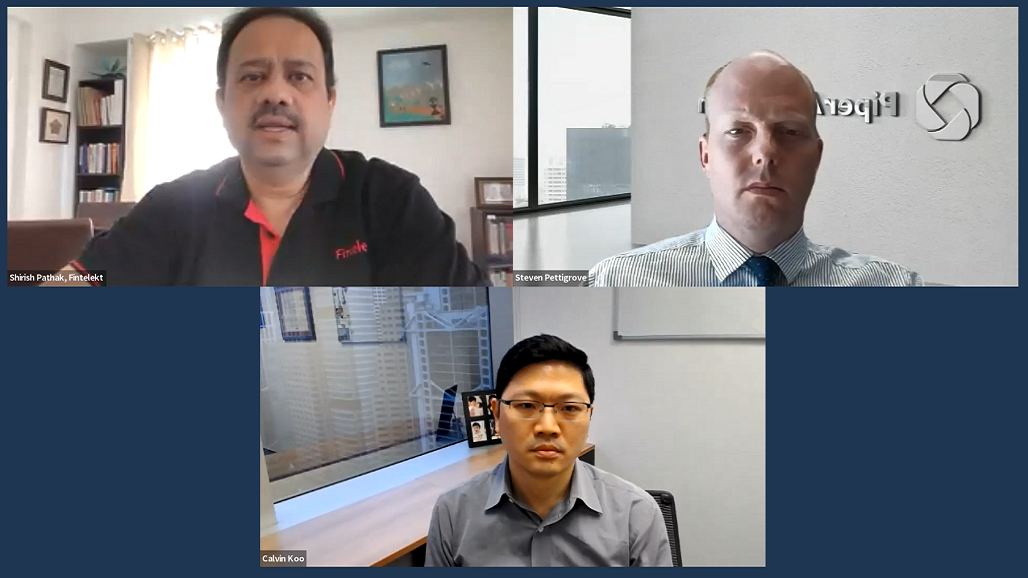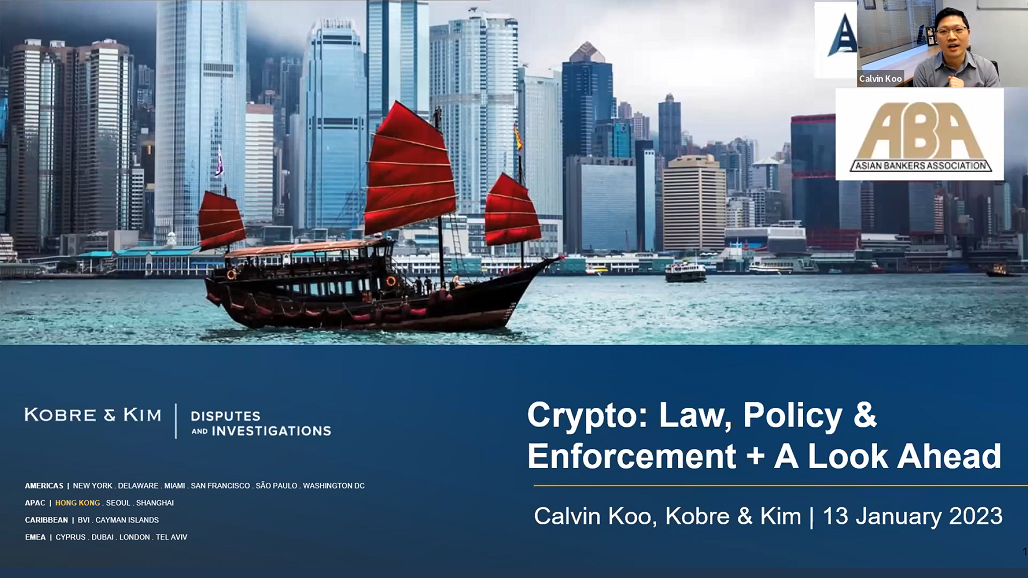Fintelekt Advisory Services and the Asian Bankers Association presented the webinar on Crypto: 2022 in Review and a Look Ahead on January 13, 2023. More than 700 participants from across 40+ countries were registered.
Shirish Pathak, Managing Director, Fintelekt Advisory Services hosted the webinar with speakers Calvin Koo, Cross-Border Disputes and Investigations Lawyer, Kobre & Kim LLP joining from Hong Kong, and Steven Pettigrove, Special Counsel, Piper Alderman joining from Melbourne, Australia.

I. The Major Developments of 2022:
(1) The year 2022 began optimistically for the crypto industry with high prices of bitcoin and other cryptocurrencies. Mainstream financial institutions started dabbling into crypto investments.
(2) There was an acknowledgement of the role of crypto and related technologies in areas such as helping the unbanked, helping businesses operate more efficiently and in attracting new investments and creating jobs within the economy.
(3) Industry players moved towards accepting the need to get licenses in relevant jurisdictions and accepting the need to have more governance, controls, transparency and AML policies.
(4) On the regulatory side, there were more concrete policy positions by jurisdictions:
In the US, the Executive Order on Ensuring Responsible Development of Digital Assets (March 2022) identified six priorities that included protecting consumers, investors and business; protecting national and global financial stability; mitigating risks (including AML risks) and promoting technology and global finance leadership.
Singapore brought in the Financial Services and Markets Bill requiring Singaporean virtual asset service companies providing services outside Singapore to be licensed and subject to local anti‐money laundering rules starting June 2022.
Several other jurisdictions moved to licensing and regulation of crypto exchanges and towards the implementation of Financial Action Task Force (FATF)’s travel rule.
“Responsible innovation was the common buzzword across jurisdictions in 2022, with a focus on promoting and developing blockchain technology in ways that will protect the interest of consumers and investors.”
Calvin Koo, Cross-Border Disputes and Investigations Lawyer, Kobre & Kim LLP
(5) However later in the year, business failures and bankruptcies led to negative news for the industry.
(6) Crypto scams and hacking were at an all-time high during 2022 and started to impact the bottom lines of banks and financial institutions (BFIs).
(7) The prominent enforcement actions in 2022 led by the US were:
US Department of Treasury’s Office of Foreign Assets Control sanctioned Tornado Cash
US Commodities and Futures Trading Commission filed charges against a Decentralized Autonomous Organization (DAO)
The New York Department of Financial Services settled with Coinbase on AML and KYC violations.
(8) Several jurisdictions piloted Central Bank Digital Currencies (CBDCs) which are expected to move trade and transactions onto blockchain.
II. The FATF Position:
In June 2022 the FATF published the ‘Targeted Update on Implementation of the FATF Standards on Virtual Assets and Virtual Asset Service Providers’. It noted that many jurisdictions have yet to completely implement the travel rule and that improvements are required on global Anti-Money Laundering and Countering the Financing of Terrorism (AML/CFT) standards particularly on assessing money laundering and terror financing risks and the application of preventative measures in crypto. The FATF also flagged off the differences in regulations across jurisdictions as being an area of concern.
III. Outlook for 2023:
(1) The short-term impact of the collapse of crypto lender Celsius and crypto exchange FTX has been in the form of loss of confidence and reduction in crypto trading volumes. Although this has led to greater scrutiny of the industry, in the longer term, it is likely to hasten the move towards regulation and licensing regimes that provide better protection to consumers and ultimately provide a framework and a stable foundation for future innovation.
(2) Greater enforcement action around frauds and market manipulation can be expected during the year.
(3) The European Union’s ‘Markets in Crypto Assets’ regulation is expected to be voted on in 2023. It is rated as among the most comprehensive crypto assets regimes and may lead to other jurisdictions adopting similar provisions.
(4) The debate around crypto assets regulation is starting to feed into broader policy questions around payments and market infrastructure. The adoption of stablecoins and CBDCs are two areas to watch out for.
“A geo-political drive in the area of CBDCs is evident, with many jurisdictions competing to lead the way in ushering in new technologies that will have consequences in driving the adoption of digital assets.“
Steven Pettigrove, Special Counsel, Piper Alderman
(5) The other trends for 2023 are likely to be around the institutional adoption of asset tokenization, the growth of Decentralised Autonomous Organisations (DAOs), applications of blockchain in gaming, NFTs, ticketing and social media, and the deployment of the venture capital that has been raised in the last 2-3 years.
IV. Outlook for AML Compliance Teams
AML compliance teams from BFIs will have to focus more seriously on identifying the risks from crypto assets especially from scams and hacking and in bringing in initiatives to address the security aspects around blockchain.
BFIs should watch for patterns of unusual transactions, sudden volumes of cash into crypto currency exchanges, customers who don’t fit the usual profile of crypto trading unusual transactions, indications of the customer being coached or told what to do while moving funds to crypto assets and connections to high-risk jurisdictions.
The use of blockchain analytics tools can help with detection of potential patterns of risky activity.
V. Webinar’s video recording
Please view the webinar’s video recording at the Fintelekt’s learning platform Fintelekt Academy HERE.
Registration on Fintelekt Academy is free and more than 80% of the content is free to view HERE.
A copy of the video is also available at the ABA YouTube channel HERE.


Leave a Reply